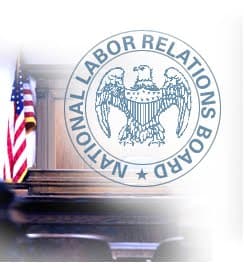By Michael J. Lotito
This week, National Labor Relations Board Chairman Mark Pearce and General Counsel Richard Griffin, Jr. came under fire from a sharply divided group of House members during a budget subcommittee hearing.
Members pressed Griffin and Pearce on the recent string of NLRB policies that will have a significant impact on labor policy and the ability of employers to manage their businesses.
In their opening statements, Pearce and Griffin reiterated that the NLRB has had to do more with less in recent years, and that the work they do is critical to ensuring that labor groups and employers treat each other appropriately.
Committee questions “Quickie” election rule
While everyone on the Subcommittee on Labor, Health and Human Services, Education and Related Agencies agreed that the NLRB does good and necessary work, Chairman Tom Cole, R-OK, set the overarching tone of the hearing by aiming his opening remarks at the NLRB’s ambush election rule, its Specialty Health Care decision, the joint-employer standard, and its infringement on Indian Nation sovereignty.
The NLRB’s ambush or “Quickie” election rule bore the brunt the lawmakers’ questions. As we reported, last week the House and Senate voted in favor of a joint resolution (S. J. Re. 8) that would block the rule from being implemented.
Congressman Andy Harris, R-MD, pointed out that labor issues require specialized legal representation to which the predominantly small employers in his mostly rural district would not have easy access. He noted the average size of a proposed bargaining unit is only in the mid-20s, meaning that this will particularly hit small employers without in-house counsel. Harris said that by the time counsel is retained, the eight-calendar-day period within which to submit a statement of position could well have passed, with Griffin conceding that the Board would then consider all points of potential contention as having been waived under the terms of the new rule.
Griffin expressed confusion as to the actual tolling period for the submission of the position statement. While Griffin maintained that the period was eight (8) business days instead of calendar days, as posited by Harris, he had to defer to Pearce, and was corrected. Harris finished by saying that now he “knew why it was called an ‘ambush’ election.”
NLRB: Elections “streamlined, not accelerated”
Pearce was question by Congressman Scott Rigell, R-VA, about the ability of employees to opt out of having their information used by a unionizing employee. Pearce admitted that they could not, and should the initial election fail, the information could continue to be used in further election efforts.
When Rigell asked Pearce why he felt the NLRB needed to accelerate and compress the time frame for elections, Pearce maintained they were “streamlined, not accelerated,” and that the rule does not actually specify a timeline. Further, Pearce said the NLRB was obligated to hold elections “as soon as practicable.”
When questioned by Congresswoman Martha Roby, R-AL, about the new joint-employer standard and the Browning-Ferris decision, Griffin and Pearce said the Board was simply returning to a more “traditional” test.
Furthermore, Griffin said that in every single case currently before the NLRB on the joint-employer issue, they are arguing under the current standard and that the Browning-Ferris standard is only being argued “in the alternative.”
NLRB wants influence over Indian tribes
When it came to the Specialty Health Care micro-unit decision, Griffin said that he did not agree with Congressman Steve Womack, R-AR, that wall-to-wall units were the “traditional” standard, and that instead the micro-unit standard was more appropriate. Griffin also did not disagree with Womack when the Congressman expressed that employers will often settle suits rather than face potentially expensive litigation.
Chairman Cole focused three rounds of questions on the NLRB’s insistence that its influence extends over Indian tribes, a position only recently taken by the Board. This comes on the heels of a pending case in the Denver-based 10th U.S. Circuit Court of Appeals in which the Board has asked the court to force the Chickasaw Nation to recognize the NLRB’s jurisdiction over the Nation’s casino employees.
More information about the hearing and copies of testimony can be found here.
